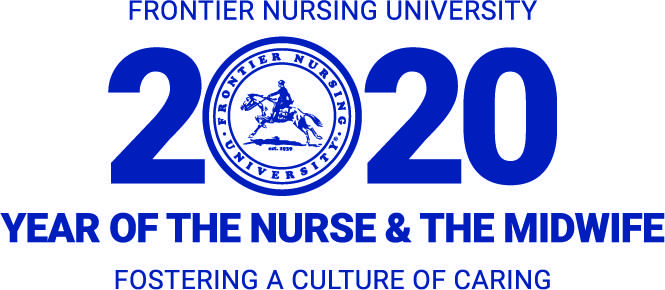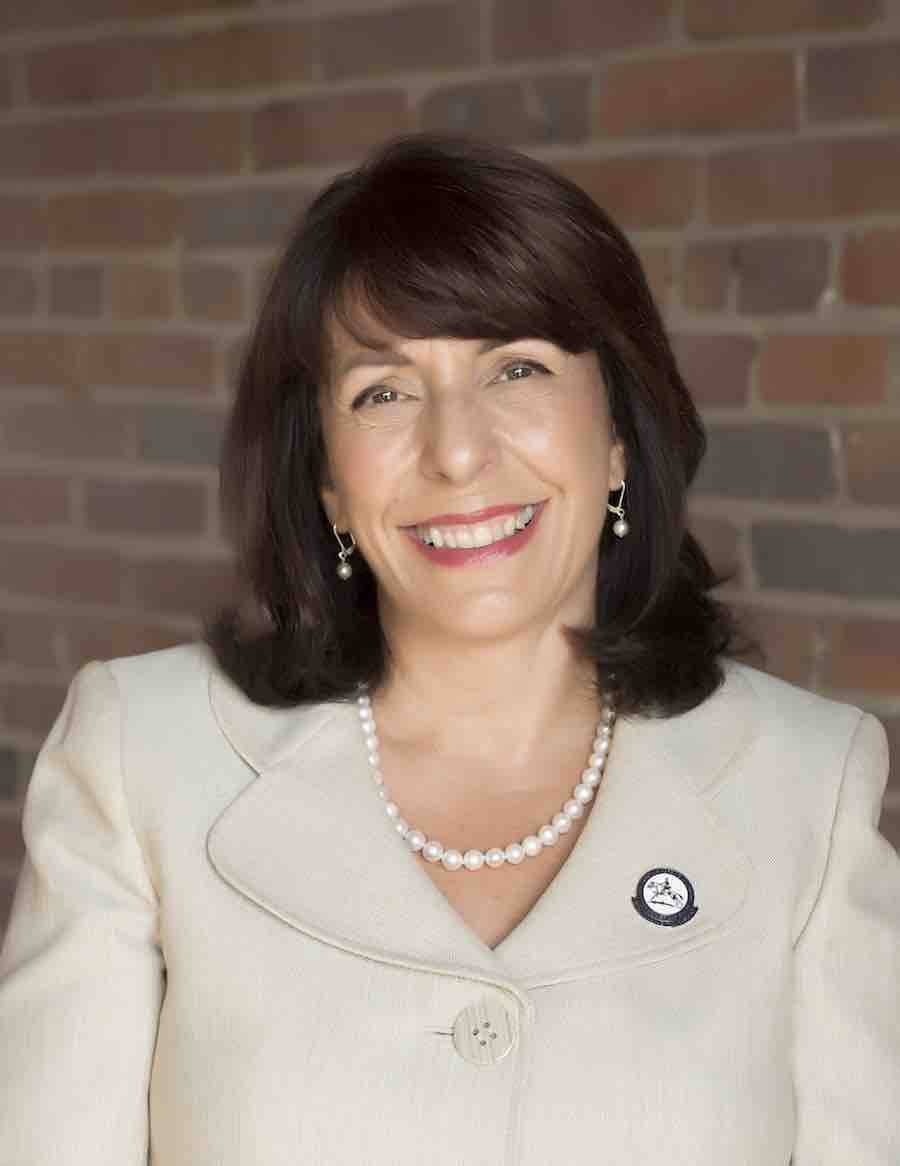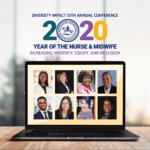The World Health Assembly, the governing body of the World Health Organization (WHO), has extended its designation of 2020 as the “Year of the Nurse and the Midwife” through 2021. The recognition, in honor of the 200th anniversary of Florence Nightingale’s birth, was extended to honor the dedication and sacrifice of healthcare workers during the COVID-19 pandemic.
 The designation also brings awareness to the importance of nurses and midwives in the health and care of populations across the globe. According to the WHO, the world needs nine million more nurses and midwives if it is to achieve universal health coverage by 2030.
The designation also brings awareness to the importance of nurses and midwives in the health and care of populations across the globe. According to the WHO, the world needs nine million more nurses and midwives if it is to achieve universal health coverage by 2030.
Frontier Nursing University (FNU) is excited to support and participate in this international campaign and to spread awareness of the specific need for more nurses and nurse-midwives in the United States. Since 1939, FNU has been educating and preparing many of these much-needed providers to serve the communities in which they live and work.
According to the Centers for Disease Control and Prevention, approximately 700 women die annually in the United States as a result of pregnancy or delivery complications, 67 percent of which were determined to be preventable.
Addressing the Healthcare Shortage
Rural areas are impacted most significantly by healthcare shortages, with the number of physicians per 10,000 people averaging 33 in urban areas versus just 13 in rural communities.
FNU’s mission is to provide accessible nurse-midwifery and nurse practitioner education to prepare competent, entrepreneurial, ethical and compassionate leaders in primary care to serve all individuals with an emphasis on women and families in diverse, rural and underserved populations.
In 1989, FNU launched its distance-learning model, which enabled FNU to expand its reach across the country. FNU’s distance learning model allows students to continue their education in the same communities in which they live and work.
Not only has FNU’s reach expanded significantly but so has its range of programs. FNU offers the master of science in nursing degree, doctor of nursing practice degree and post-graduate certificates with specialties including nurse-midwife, family nurse practitioner, women’s health care nurse practitioner and psychiatric-mental health nurse practitioner. In 2018, FNU produced approximately 39 percent of the certified nurse-midwifery graduates in the U.S.
More than five million U.S. women live in counties that have no hospital offering obstetric care and no obstetric providers.
Diversity, Equity and Inclusion
Central to FNU's mission is the understanding that diversity, equity and inclusion are keys to the future success of the health care delivery system.
Racial disparities are evident in health care. The United States has experienced increasing maternal mortality rates over the last 25 years, and the risk of pregnancy related death for black women is three to four times higher than for white women. Additionally, according to the Centers for Disease Control, people of color are more likely to die from COVID-19 when compared to white people due to health disparities and inequities.
FNU recognizes and strongly supports the need to increase diversity within the nursing and midwifery professions. We believe in the benefits of a diverse university and the positive impacts our diverse graduates can make in communities across the country. Our graduates serve people of all races and cultures and are increasingly coming from diverse backgrounds. It is imperative that our students, faculty and staff have cultural awareness and competency in order to effectively advance our mission of servant leadership.
Our Diversity, Equity, and Inclusion (DEI) Office operates with the goal of ensuring students, faculty, and staff are provided with an environment that promotes DEI and encourages the success of all community members.
FNU recognized the need to increase diversity within the nursing and midwifery professions, and in 2010, set out to increase enrollment of underrepresented students. In 10 years, FNU’s student of color population has increased from 9 to 24.06%.
What is a Certified Nurse-Midwife?
An important objective for FNU this year is to define the role of the certified nurse-midwife so the public understands the broad scope of services these professionals provide.
Certified nurse-midwives (CNMs) are advanced practice registered nurses (APRNs) backed by the American College of Nurse-Midwives. To become a CNM, registered nurses must graduate from a master’s or higher-level nurse-midwifery education program accredited by the Accreditation Commission for Midwifery Education (ACME) and pass the national Certified Nurse-Midwife Examination through the American Midwifery Certification Board. All CNMs must hold state licensure.
 “We are very excited to share the message of the International Year of the Nurse and the Midwife. Greater awareness of our healthcare disparities and identification of the potential solutions are essential steps in improving the reach and access to healthcare in this country.”
“We are very excited to share the message of the International Year of the Nurse and the Midwife. Greater awareness of our healthcare disparities and identification of the potential solutions are essential steps in improving the reach and access to healthcare in this country.”
- Dr. Susan Stone
President
FNU Blog

FNU’s 10th Annual Diversity Impact Conference: Year of the Nurse and Midwife Increasing Diversity, Equity, and Inclusion
On June 11-13, 2020 the Office of Diversity, Equity, and Inclusion (DEI) at Frontier Nursing University (FNU) hosted the 10th Annual Diversity Impact Conference. FNU started this tradition in 2010 … [Read More...]

Year of the Nurse and the Midwife Spotlight: Stephanie VanderHorst
Stephanie VanderHorst, CNM, MSN, Class 28, had a plan. She was going to open a freestanding birthing center in Auburn, Ind., a rural community of 13,000 people located in DeKalb County, two hours … [Read More...]

The Importance of the International Year of the Nurse and the Midwife
By FNU President Dr. Susan E. Stone, DNSc, CNM, FACNM, FAAN In 2019, the Executive Board of the World Health Organization (WHO) proposed that the year 2020 be designated the “Year of the Nurse and the … [Read More...]



















 Carrie Belin is an experienced board-certified Family Nurse Practitioner and a graduate of the Johns Hopkins DNP program, Johns Hopkins Bloomberg School of Public Health, Georgetown University School of Nursing, and Johns Hopkins School of Nursing. She has also completed fellowships at Georgetown and the University of California Irvine.
Carrie Belin is an experienced board-certified Family Nurse Practitioner and a graduate of the Johns Hopkins DNP program, Johns Hopkins Bloomberg School of Public Health, Georgetown University School of Nursing, and Johns Hopkins School of Nursing. She has also completed fellowships at Georgetown and the University of California Irvine. Angie has been a full-scope midwife since 2009. She has experience in various birth settings including home, hospital, and birth centers. She is committed to integrating the midwifery model of care in the US. She completed her master’s degree in nurse-midwifery at Frontier Nursing University (FNU) and her Doctorate at Johns Hopkins University. She currently serves as the midwifery clinical faculty at FNU. Angie is motivated by the desire to improve the quality of healthcare and has led quality improvement projects on skin-to-skin implementation, labor induction, and improving transfer of care practices between hospital and community midwives. In 2017, she created a short film on skin-to-skin called
Angie has been a full-scope midwife since 2009. She has experience in various birth settings including home, hospital, and birth centers. She is committed to integrating the midwifery model of care in the US. She completed her master’s degree in nurse-midwifery at Frontier Nursing University (FNU) and her Doctorate at Johns Hopkins University. She currently serves as the midwifery clinical faculty at FNU. Angie is motivated by the desire to improve the quality of healthcare and has led quality improvement projects on skin-to-skin implementation, labor induction, and improving transfer of care practices between hospital and community midwives. In 2017, she created a short film on skin-to-skin called 










 Justin C. Daily, BSN, RN, has ten years of experience in nursing. At the start of his nursing career, Justin worked as a floor nurse on the oncology floor at St. Francis. He then spent two years as the Director of Nursing in a small rural Kansas hospital before returning to St. Francis and the oncology unit. He has been in his current position as the Chemo Nurse Educator for the past four years. He earned an Associate in Nurse from Hutchinson Community College and a Bachelor of Science in Nursing from Bethel College.
Justin C. Daily, BSN, RN, has ten years of experience in nursing. At the start of his nursing career, Justin worked as a floor nurse on the oncology floor at St. Francis. He then spent two years as the Director of Nursing in a small rural Kansas hospital before returning to St. Francis and the oncology unit. He has been in his current position as the Chemo Nurse Educator for the past four years. He earned an Associate in Nurse from Hutchinson Community College and a Bachelor of Science in Nursing from Bethel College. Brandy Jackson serves as the Director of Undergraduate Nursing Programs and Assistant Educator at Wichita State University and Co-Director of Access in Nursing. Brandy is a seasoned educator with over 15 years of experience. Before entering academia, Brandy served in Hospital-based leadership and Critical Care Staff nurse roles. Brandy is passionate about equity in nursing education with a focus on individuals with disabilities. Her current research interests include accommodations of nursing students with disabilities in clinical learning environments and breaking down barriers for historically unrepresented individuals to enter the nursing profession. Brandy is also actively engaged in Interprofessional Education development, creating IPE opportunities for faculty and students at Wichita State. Brandy is an active member of Wichita Women for Good and Soroptimist, with the goal to empower women and girls. Brandy is a TeamSTEPPS master trainer. She received the DASIY Award for Extraordinary Nursing Faculty in 2019 at Wichita State University.
Brandy Jackson serves as the Director of Undergraduate Nursing Programs and Assistant Educator at Wichita State University and Co-Director of Access in Nursing. Brandy is a seasoned educator with over 15 years of experience. Before entering academia, Brandy served in Hospital-based leadership and Critical Care Staff nurse roles. Brandy is passionate about equity in nursing education with a focus on individuals with disabilities. Her current research interests include accommodations of nursing students with disabilities in clinical learning environments and breaking down barriers for historically unrepresented individuals to enter the nursing profession. Brandy is also actively engaged in Interprofessional Education development, creating IPE opportunities for faculty and students at Wichita State. Brandy is an active member of Wichita Women for Good and Soroptimist, with the goal to empower women and girls. Brandy is a TeamSTEPPS master trainer. She received the DASIY Award for Extraordinary Nursing Faculty in 2019 at Wichita State University.  Dr. Sabrina Ali Jamal-Eddine is an Arab-disabled queer woman of color with a PhD in Nursing and an interdisciplinary certificate in Disability Ethics from the University of Illinois Chicago (UIC). Dr. Jamal-Eddine’s doctoral research explored spoken word poetry as a form of critical narrative pedagogy to educate nursing students about disability, ableism, and disability justice. Dr. Jamal-Eddine now serves as a Postdoctoral Research Associate in UIC’s Department of Disability and Human Development and serves on the Board of Directors of the National Organization of Nurses with Disabilities (NOND). During her doctoral program, Sabrina served as a Summer Fellow at a residential National Endowment of the Humanities (NEH) Summer Institute at Arizona State University (2023), a summer fellow at Andrew W. Mellon’s National Humanities Without Walls program at University of Michigan (2022), a Summer Research Fellow at UC Berkeley’s Othering & Belonging Institute (2021), and an Illinois Leadership Education in Neurodevelopmental and related Disabilities (LEND) trainee (2019-2020).
Dr. Sabrina Ali Jamal-Eddine is an Arab-disabled queer woman of color with a PhD in Nursing and an interdisciplinary certificate in Disability Ethics from the University of Illinois Chicago (UIC). Dr. Jamal-Eddine’s doctoral research explored spoken word poetry as a form of critical narrative pedagogy to educate nursing students about disability, ableism, and disability justice. Dr. Jamal-Eddine now serves as a Postdoctoral Research Associate in UIC’s Department of Disability and Human Development and serves on the Board of Directors of the National Organization of Nurses with Disabilities (NOND). During her doctoral program, Sabrina served as a Summer Fellow at a residential National Endowment of the Humanities (NEH) Summer Institute at Arizona State University (2023), a summer fellow at Andrew W. Mellon’s National Humanities Without Walls program at University of Michigan (2022), a Summer Research Fellow at UC Berkeley’s Othering & Belonging Institute (2021), and an Illinois Leadership Education in Neurodevelopmental and related Disabilities (LEND) trainee (2019-2020). Vanessa Cameron works for Vanderbilt University Medical Center in Nursing Education & Professional Development. She is also attending George Washington University and progressing towards a PhD in Nursing with an emphasis on ableism in nursing. After becoming disabled in April 2021, Vanessa’s worldview and perspective changed, and a recognition of the ableism present within healthcare and within the culture of nursing was apparent. She has been working since that time to provide educational foundations for nurses about disability and ableism, provide support for fellow disabled nursing colleagues, and advocate for the disabled community within healthcare settings to reduce disparities.
Vanessa Cameron works for Vanderbilt University Medical Center in Nursing Education & Professional Development. She is also attending George Washington University and progressing towards a PhD in Nursing with an emphasis on ableism in nursing. After becoming disabled in April 2021, Vanessa’s worldview and perspective changed, and a recognition of the ableism present within healthcare and within the culture of nursing was apparent. She has been working since that time to provide educational foundations for nurses about disability and ableism, provide support for fellow disabled nursing colleagues, and advocate for the disabled community within healthcare settings to reduce disparities. Dr. Lucinda Canty is a certified nurse-midwife, Associate Professor of Nursing, and Director of the Seedworks Health Equity in Nursing Program at the University of Massachusetts Amherst. She earned a bachelor’s degree in nursing from Columbia University, a master’s degree from Yale University, specializing in nurse-midwifery, and a PhD from the University of Connecticut. Dr. Canty has provided reproductive health care for over 29 years. Her research interests include the prevention of maternal mortality and severe maternal morbidity, reducing racial and ethnic health disparities in reproductive health, promoting diversity in nursing, and eliminating racism in nursing and midwifery.
Dr. Lucinda Canty is a certified nurse-midwife, Associate Professor of Nursing, and Director of the Seedworks Health Equity in Nursing Program at the University of Massachusetts Amherst. She earned a bachelor’s degree in nursing from Columbia University, a master’s degree from Yale University, specializing in nurse-midwifery, and a PhD from the University of Connecticut. Dr. Canty has provided reproductive health care for over 29 years. Her research interests include the prevention of maternal mortality and severe maternal morbidity, reducing racial and ethnic health disparities in reproductive health, promoting diversity in nursing, and eliminating racism in nursing and midwifery. Dr. Lisa Meeks is a distinguished scholar and leader whose unwavering commitment to inclusivity and excellence has significantly influenced the landscape of health professions education and accessibility. She is the founder and executive director of the DocsWithDisabilities Initiative and holds appointments as an Associate Professor in the Departments of Learning Health Sciences and Family Medicine at the University of Michigan.
Dr. Lisa Meeks is a distinguished scholar and leader whose unwavering commitment to inclusivity and excellence has significantly influenced the landscape of health professions education and accessibility. She is the founder and executive director of the DocsWithDisabilities Initiative and holds appointments as an Associate Professor in the Departments of Learning Health Sciences and Family Medicine at the University of Michigan. Dr. Nikia Grayson, DNP, MSN, MPH, MA, CNM, FNP-C, FACNM (she/her) is a trailblazing force in reproductive justice, blending her expertise as a public health activist, anthropologist, and family nurse-midwife to champion the rights and health of underserved communities. Graduating with distinction from Howard University, Nikia holds a bachelor’s degree in communications and a master’s degree in public health. Her academic journey also led her to the University of Memphis, where she earned a master’s in medical anthropology, and the University of Tennessee, where she achieved both a master’s in nursing and a doctorate in nursing practice. Complementing her extensive education, she completed a post-master’s certificate in midwifery at Frontier Nursing University.
Dr. Nikia Grayson, DNP, MSN, MPH, MA, CNM, FNP-C, FACNM (she/her) is a trailblazing force in reproductive justice, blending her expertise as a public health activist, anthropologist, and family nurse-midwife to champion the rights and health of underserved communities. Graduating with distinction from Howard University, Nikia holds a bachelor’s degree in communications and a master’s degree in public health. Her academic journey also led her to the University of Memphis, where she earned a master’s in medical anthropology, and the University of Tennessee, where she achieved both a master’s in nursing and a doctorate in nursing practice. Complementing her extensive education, she completed a post-master’s certificate in midwifery at Frontier Nursing University.









 Dr. Tia Brown McNair is the Vice President in the Office of Diversity, Equity, and Student Success and Executive Director for the Truth, Racial Healing, and Transformation (TRHT) Campus Centers at the American Association of Colleges and Universities (AAC&U) in Washington, DC. She oversees both funded projects and AAC&U’s continuing programs on equity, inclusive excellence, high-impact practices, and student success. McNair directs AAC&U’s Summer Institutes on High-Impact Practices and Student Success, and TRHT Campus Centers and serves as the project director for several AAC&U initiatives, including the development of a TRHT-focused campus climate toolkit. She is the lead author of From Equity Talk to Equity Walk: Expanding Practitioner Knowledge for Racial Justice in Higher Education (January 2020) and Becoming a Student-Ready College: A New Culture of Leadership for Student Success (July 2016 and August 2022 Second edition).
Dr. Tia Brown McNair is the Vice President in the Office of Diversity, Equity, and Student Success and Executive Director for the Truth, Racial Healing, and Transformation (TRHT) Campus Centers at the American Association of Colleges and Universities (AAC&U) in Washington, DC. She oversees both funded projects and AAC&U’s continuing programs on equity, inclusive excellence, high-impact practices, and student success. McNair directs AAC&U’s Summer Institutes on High-Impact Practices and Student Success, and TRHT Campus Centers and serves as the project director for several AAC&U initiatives, including the development of a TRHT-focused campus climate toolkit. She is the lead author of From Equity Talk to Equity Walk: Expanding Practitioner Knowledge for Racial Justice in Higher Education (January 2020) and Becoming a Student-Ready College: A New Culture of Leadership for Student Success (July 2016 and August 2022 Second edition).